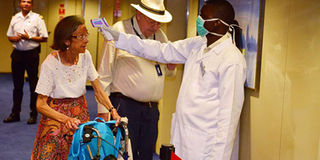Coronavirus: Antibiotics, fever relievers helping passengers beat checks at airports

Tourists are screened at the Port of Mombasa, Kenya, on February 13, 2020 as way of abating the spread of coronavirus. PHOTO | LABAN WALLOGA | NATION MEDIA GROUP
What you need to know:
- Prof Njenga said the laser thermometers at airports are inadequate.
- Most cases in Milan arose due to mismanagement — the patient was released from a health facility.
- Some 80 per cent of cases of the viruses cause mild infections and people survive.
Experts have faulted the checks put in place to fight coronavirus and revealed how passengers are beating them at airports across the world.
Kariuki Njenga, an infectious-disease expert and the director of the Washington State University Global health programme in Kenya, told the Sunday Nation that some travellers take antibiotics and others fever relievers a few hours before landing to throw off the laser thermometers at airports. Prof Njenga said the laser thermometers at airports are inadequate.
SELF-QUARANTINE
The researcher, who has studied other coronaviruses such as MERS-CoV, criticised the Ministry of Health on their statement about the 239 passengers allowed into Kenya from China as “a little information and a display of how the self-quarantine was poorly handled, and that it was a public health miscalculation to put 47 million people at risk for a mere hundred people”.
Most cases in Milan arose due to mismanagement — the patient was released from a health facility. The case in Nigeria was imported from Milan.
Rodney Adam, a professor of pathology and medicine and chair of the Infection Control Committee at Aga Khan University Hospital, said the focus should not be on travel restrictions but on the community infections.
“Despite the travel restrictions, the coronavirus has spread to multiple continents, so it is unlikely that travel restrictions will prevent the infection from coming to other parts of the world. The big question is, how much secondary transmission there will be; that is, when infected patients go to other countries, how many people will they infect?” he posed.
RISK TO ECONOMY
Prof Njenga, a former head of labs at Centers for Disease Control and Prevention, warned that an economy like Kenya’s would suffer immensely from a single case of Covid-19 virus.
He explained: “Public schools and transport would be closed; no one will want to visit here for tourism because they also know that our health system is unable to handle.”
Some 80 per cent of cases of the viruses cause mild infections and people survive. Another 20 per cent of patients have severe or critical illness, ranging from shortness of breath to septic shock and multi-organ failure.
At this stage, the patient requires intensive care and life support such as respiratory machines, and these are in short supply in Kenya.
In two per cent of the reported cases, the virus is fatal, and the risk of death increases the older a patient is, and with underlying health conditions.
In the heat of criticism for allowing flights from China, Health Chief Administrative Secretary Rashid Aman said the ministry did not want to discriminate against people.
35 COUNTRIES
Dr Aman added that self-quarantine did not mean the person was infected. Those on self-quarantine are to remain indoors for 14 days to monitor any symptoms of coronavirus.
Prof Njenga said the passengers that had been allowed to self-quarantine are those that the government established had not been anywhere near Hubei province or Wuhan, the epicentres of the Covid-19 virus.
He explained: “We cannot be assured that they knew that information and would do it. Therefore, we cannot also trust the strategies that the government has put in place to protect Kenyans.”
The coronavirus was first reported in Wuhan and has since spread to more than 35 countries across the world.
COMPLAINTS
Countries like the US have barred foreigners from affected countries, and allow Americans in but have adopted a mandatory two-week quarantine under clinical supervision in health facilities.
How the voluntary quarantine in Kenya has been carried out has attracted fierce complaints from the scientific community because it is not clear what would be done if the people are not compliant.
Recommendations from the CDC state that healthcare officials follow those who are in self-quarantine daily to check their temperature and monitor them for symptoms.
But no public health official can enforce a quarantine or ensure that the subjected individuals are remaining in their homes, unless it is an involuntary and state-sanctioned quarantine for the public good.





